A Community Approach to Sustainability
- By Theresa Katalinas
- 09/01/16
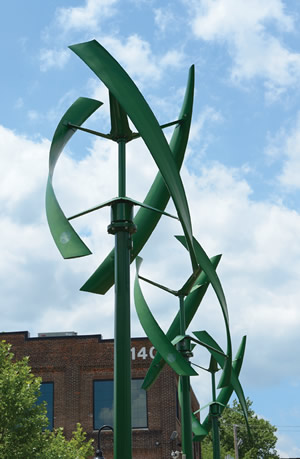
PHOTOS © DAVID DEBALKO
With an eye on riverfront expansion,
Pottstown, a Montgomery County, Pennsylvania
community, acquired a former energy
generating station situated on a three-acre
brownfield site adjacent to the widely traveled
Schuylkill River Trail and the Schuylkill River.
“We wanted it to be something, but we
didn’t know what,” Pottstown Borough Manager
Mark Flanders says. “It was sitting on the edge of
our Riverfront Park. We wanted some use.”
After underusing the property for years as
borough property storage, in 2009 the municipality
transferred the land to Montgomery County
Community College (MCCC). Over the course of
a three-phase project, MCCC transformed the
space into a Sustainability and Innovation
Hub, which opened its doors at the West
Campus in Pottstown in April.
The building is a space where students, faculty
and the community can collaborate on environmental
projects and research in science,
technology, engineering and
math-related (STEM) fields.
A GROWING PROJECT
For 50 years, MCCC has grown with the
surrounding community to meet the evolving
educational and workforce development
needs of Montgomery County. The college’s
comprehensive curriculum includes more than
100 associate degree/certificate programs, as
well as specialized workforce development
training and certifications. The transformation
of the former energy-generating station into a
state-of-the-art center for education, innovation
and conservation supports and continues
MCCC’s mission to benefit both its students and
the community.
The first floor of the new Sustainability and
Innovation Hub features a hydroponics and
aquaponics laboratory. Aquaponics is a system
of aquaculture in which the waste produced by
farmed fish provides nutrients for soil-less, or
hydroponic, plants that, in turn, purify the water.
The second floor is a makerspace for 3D
printing, robotics and engineering design. The
mezzanine floor is an open area for classroom
or meeting space.
David DiMattio, Ph.D., MCCC vice president
of West Campus, was a primary proponent of
the project. Formerly the dean of STEM, DiMattio,
who began working at the College in 2014,
pushed for the Hub’s completion. He says the
biggest challenge was creating a fully adaptable
building.
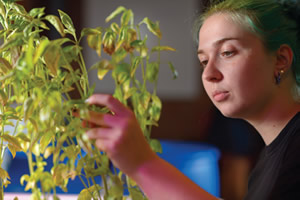
PHOTOS © DAVID DEBALKO
“We are trying to establish a resource that
is very flexible and able to quickly morph into
something else if necessary,” he says. “Even
though there are some laboratory-like environments,
it could absolutely be repurposed to fit
another competency.”
A current example is a project analyzing how
the arts play a role in science. “We have arts students
collaborating with engineering students
to make aesthetically pleasing bicycle racks,”
DiMattio said.
Additionally, the Fox Chase Cancer Center’s
Immersion Science Program recently utilized
the building to bring a collaborative, hands-on
research program to middle-school students
from the region. The weeklong program gave
students the opportunity to learn and practice
more than a dozen laboratory techniques and
experimental inquiry.
The building itself may be all encompassing,
but student research is the overarching
theme. “It allows a community member to be
exposed to a skill set, a competency in a particular
area,” DiMattio explains.
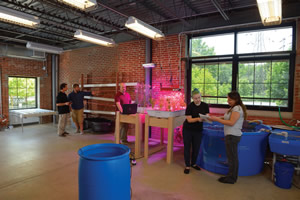
PHOTOS © DAVID DEBALKO
RESEARCH-DRIVEN SUSTAINABILITY
Research is central to the work of MCCC student
interns Brenden Shoemaker and Emily Bohn.
Shoemaker’s project is a grow wall, which
incorporates a Dutch bucket system to aid in
growing tomatoes and hops indoors instead of
their typical outdoor growing location.
Bohn conducts the daily aquaponics testing,
checking pH, nitrates and ammonia levels. She
also analyzes the process and outcome of strawberries
cultivated through the regular aquaponics
method with pipes in comparison to strawberries
grown with pellets. “This kind of opportunity to
do research at a community college level is really
unprecedented,” says Bohn, who plans to study
environmental science. “The connections you
make really are incredible.”
DiMattio says students are in the lab an average
of four to five days per week, inventing
ways to enhance and improve the aquaponics
unit. When parasites became a problem, for
example, students collaborated to find a deterrent
— ladybugs — that helped to organically
cleanse the process.
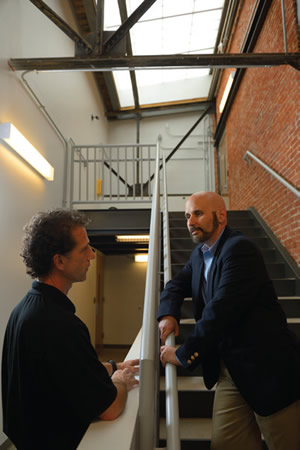
PHOTOS © DAVID DEBALKO
“We’re trying to find low-cost ways for the
grower at home to use recycled plastics and
recycled wood,” Shoemaker says. “It’s a whole
ecosystem that works together, so there’s not a
lot of waste products.”
Since crops — including lavender, mint
and basil — are grown indoors, less water
is needed. “We’re not losing water to the sun
(evaporation),” Bohn says. “There’s no fertilizer
runoff. We’re recycling the water constantly.
You can grow plants and fish in the same system
cohesively.”
In addition to water conservation efforts,
the aquaponics efforts further sustainable science
and self-sufficiency.
As a way to increase collaboration, DiMattio
hopes to replicate the aquaponics lab functions
at local high schools, empowering students to
share data, scientific methodologies and hypotheses.
He also plans to offer a STEM activity
day with local schools. The greater Pottstown
Area robotics student organization will eventually
be using the Hub as a resource. Future joint
initiatives are in the works, DiMattio says.
PARTNERING FOR THE ENVIRONMENT
MCCC also has worked closely with the
greater Pottstown community and organizations
in creating its multipurpose approach to
learning and collaboration.
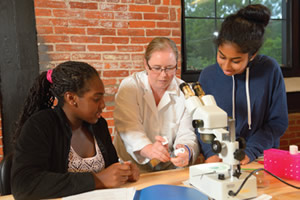
PHOTOS © DAVID DEBALKO
WE CAN WORK WITH THIS. The renovated
building that houses MCCC’s Sustainability and Innovation
Hub, a former energy generating station,
maintains its original brick walls and open beams
and uses available natural lighting from skylights
and windows in the hallways and rooms. The Hub’s
classroom spaces can be repurposed for different
educational and community uses, including a
hydroponics and aquaponics laboratory (left) and
STEM programs for middle school students from
the region.
Throughout the planning, construction and
opening of the Hub, MCCC coordinated with the
Schuylkill River Heritage Area (SRHA), a nonprofit
organization committed to celebrating the
Schuylkill River watershed, which is home to 3.2
million people across five greater Philadelphia
counties. The organization’s office is located in
a portion of the Sustainability and Innovation
Hub building. Executive Director Silas Chamberlin
says he worked alongside MCCC as a “casual
advisor” to help plan the building and offered
feedback on ways to make it community-centric.
Moving forward, Chamberlin says he intends
to partner with MCCC in offering internships and
class credits for engineering and environmental
science students. Chamberlin envisions students
developing technology to monitor water quality
in the Schuylkill River. The adjacent Schuylkill
River Trail, which is used approximately 2 million
times per year, could benefit from studentcreated
drones to help monitor the land that the
SRHA owns and maintains.
Chamberlin credits MCCC with transforming
the area from a brownfield into a recreational
hub for all to enjoy. “Riverfront Park,
where the Hub is located, is Pottstown’s riverfront,”
he says. “It was just a gravel lot and
some overgrown weeds and an abandoned
industrial building. It wasn’t very welcoming.”
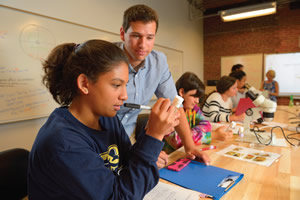
PHOTOS © DAVID DEBALKO
WHAT GOES AROUND. This community-oriented facility benefits a wide variety of
students, from middle-schoolers to members of the area’s active workforce. One
of the many spokes in the Sustainability and Innovation Hub centers on workforce
development. For example, MCCC offers a new iOS Software Developer Academy at the
Hub, where students can learn to develop mobile applications. The Hub also features
an engineering design center that will prepare students for more advanced technology
fields, working with robotics, drones and 3D printers.
The college’s improved parking lot, which
captures water runoff and features a rain garden,
is a model for green infrastructure, according
to Chamberlin. It also makes the park more
inviting. Wind turbines in the environmentally
friendly lot generate energy to light the parking
lot at night. Turbines also provide data to
students, DiMattio says.
“Many aspects of sustainable science are being translated into the classroom,” DiMattio says. “Students can actually
learn from the data how much energy is needed to sustain the building…
and what is necessary to help the crops grow.”
Since completion of the improvements and state-of-the-art building,
Chamberlin said SRHA started offering kayak and bike rentals, encouraging
community involvement and expanding the area’s recreational opportunities.
“Thanks to MCCC for redeveloping this building, which is really the hub for
people experiencing and connecting with the Schuylkill River in Pottstown,”
Chamberlin says. “It really brought some life back to the park.”
EDUCATION FUELS ECONOMIC DEVELOPMENT
The Hub is poised to reinvigorate the greater Pottstown business community
as well, officials indicate.
TriCounty Area Chamber of Commerce President Eileen Dautrich views the
Hub as an “opportunity to attract business,” as well as boost existing business
operations through employee training and product development.
“That’s a great asset for us, this community and the Pottstown employment
market,” Dautrich says. “We benefit from that. We’re able to attract employers
that might be looking for certain training.”
DiMattio views the Hub as a wagon wheel. “You have spokes coming from
any direction, and they meet at a common source,” he explains.
One of the many spokes in this Hub centers on workforce development.
To date, DiMattio says that some local companies have sent employees to the
iOS Software Developer Academy to improve their mobile software development
skills. MCCC also will offer engineering course work, as well as non-credit aquaponics and additional software development classes.
“Many of the things that we offer at the Hub could translate into professional
development for local industry,” he says.
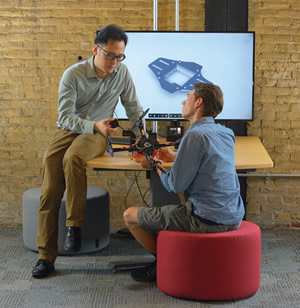
PHOTOS © DAVID DEBALKO
In 2015, MCCC received a $2 million matching grant from the Montgomery
County Economic Development Corporation. This gift established an endowment
supporting MCCC’s expertise in educating and training students for regional
jobs and careers. The first distribution from matched funds is helping to
support the Hub’s Hydroponics and Aquaponics Laboratory and the Software
Developer Academy, among other initiatives.
Flanders agrees that the available courses and training will help revitalize
the economic face of the former industrial town. “Every job in there represents
wage taxes,” Flanders says, noting that the borough will see a gain in revenue,
as well as in visitors to local shops, restaurants and other businesses.
The Hub is also drawing in the community for various networking and
business-related functions. Dautrich said the Chamber is looking to use the
space for an upcoming event to introduce members and young women in the
community — and take advantage of educational opportunities.
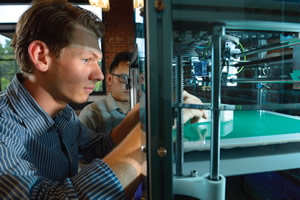
PHOTOS © DAVID DEBALKO
“It was created for that purpose and lends itself to a place where groups can
come together and have technology accessible,” she says.
Recently the Pottstown Borough Council and the Pottstown School Board
held a joint meeting at the Hub.
“There was an attitude of appreciation for what the college did with it,”
Flanders says. “It was a dramatic change. I don’t think anybody expected what
it ended up being. It’s a pretty good fit.”
This article originally appeared in the College Planning & Management September 2016 issue of Spaces4Learning.